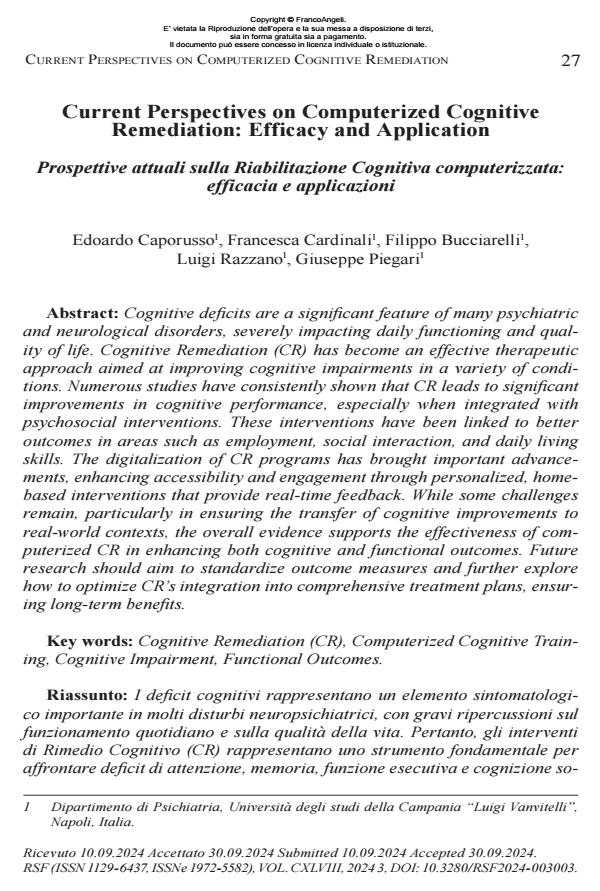Current Perspectives on Computerized Cognitive Remediation: Efficacy and Application
Titolo Rivista RIVISTA SPERIMENTALE DI FRENIATRIA
Autori/Curatori Edoardo Caporusso, Francesca Cardinali, Filippo Bucciarelli, Luigi Razzano, Giuseppe Piegari
Anno di pubblicazione 2024 Fascicolo 2024/3
Lingua Inglese Numero pagine 17 P. 27-43 Dimensione file 771 KB
DOI 10.3280/RSF2024-003003
Il DOI è il codice a barre della proprietà intellettuale: per saperne di più
clicca qui
Qui sotto puoi vedere in anteprima la prima pagina di questo articolo.
Se questo articolo ti interessa, lo puoi acquistare (e scaricare in formato pdf) seguendo le facili indicazioni per acquistare il download credit. Acquista Download Credits per scaricare questo Articolo in formato PDF

FrancoAngeli è membro della Publishers International Linking Association, Inc (PILA), associazione indipendente e non profit per facilitare (attraverso i servizi tecnologici implementati da CrossRef.org) l’accesso degli studiosi ai contenuti digitali nelle pubblicazioni professionali e scientifiche.
Cognitive deficits are a significant feature of many psychiatric and neurological disorders, severely impacting daily functioning and quality of life. Cognitive Remediation (CR) has become an effective therapeutic approach aimed at improving cognitive impairments in a variety of conditions. Numerous studies have consistently shown that CR leads to significant improvements in cognitive performance, especially when integrated with psychosocial interventions. These interventions have been linked to better outcomes in areas such as employment, social interaction, and daily living skills. The digitalization of CR programs has brought important advancements, enhancing accessibility and engagement through personalized, homebased interventions that provide real-time feedback. While some challenges remain, particularly in ensuring the transfer of cognitive improvements to real-world contexts, the overall evidence supports the effectiveness of computerized CR in enhancing both cognitive and functional outcomes. Future research should aim to standardize outcome measures and further explore how to optimize CR’s integration into comprehensive treatment plans, ensuring long-term benefits.
I deficit cognitivi rappresentano un elemento sintomatologico importante in molti disturbi neuropsichiatrici, con gravi ripercussioni sul funzionamento quotidiano e sulla qualità della vita. Pertanto, gli interventi di Rimedio Cognitivo (CR) rappresentano uno strumento fondamentale per affrontare deficit di attenzione, memoria, funzione esecutiva e cognizione sociale in varie patologie. Numerosi studi hanno dimostrato che il CR porta a significativi miglioramenti sia nelle funzioni cognitive che nel funzionamento nella vita reale, soprattutto se integrato con interventi psicosociali. La digitalizzazione dei programmi di CR ha introdotto importanti miglioramenti, aumentando l’accessibilità e il coinvolgimento grazie a interventi personalizzati e domiciliari, con feedback in tempo reale. Sebbene alcune controversie restino, l’evidenza complessiva supporta l’efficacia del CR computerizzato nel migliorare sia le capacità cognitive che funzionali in varie popolazioni di pazienti. La ricerca futura dovrebbe puntare a standardizzare le misure di valutazione e ottimizzare l’integrazione del CR nei piani di trattamento completi, garantendo benefici a lungo termine.
Parole chiave:Rimedio Cognitivo, Rimedio Cognitivo Computerizzato, Deficit Cognitivi, Funzionamento.
Edoardo Caporusso, Francesca Cardinali, Filippo Bucciarelli, Luigi Razzano, Giuseppe Piegari, Current Perspectives on Computerized Cognitive Remediation: Efficacy and Application in "RIVISTA SPERIMENTALE DI FRENIATRIA" 3/2024, pp 27-43, DOI: 10.3280/RSF2024-003003